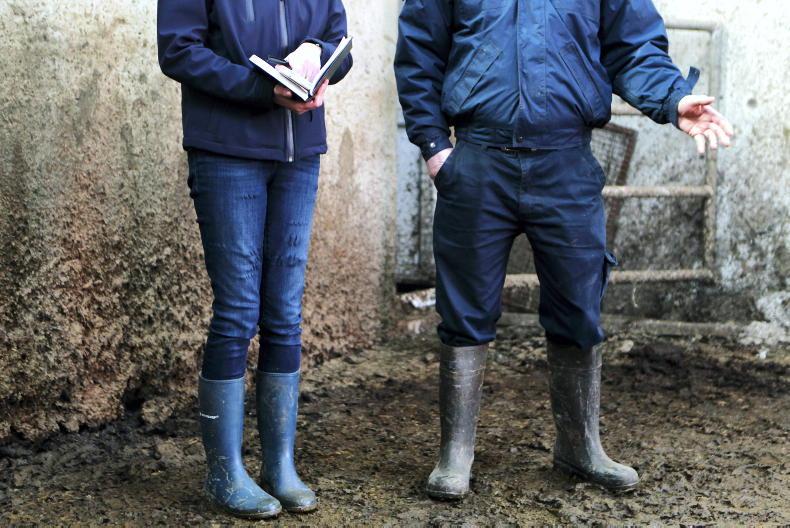A DAERA review of existing cross-compliance rules has identified various requirements that are neither relevant nor worthwhile in NI, and
are therefore likely to be excluded as part of a simplified regime, most likely starting from 2024.
New controls are to be introduced as part of the overhaul in farm support as outlined in a consultation on future agricultural policy launched last Tuesday.
Central to the proposals is an area-based Resilience payment to replace the basic payment scheme (BPS), and Farming for Nature measures, which are expected to take an increasing share of the available budget into the future.
A simplified system of Farm Sustainability Standards (FSS) which will replace cross-compliance, will apply to both Resilience and Farming for Nature schemes.
Current system
At present farmers must comply with what are known as “cross-compliance verifiable standards”. These standards are listed across 13 Statutory Management Requirements (SMRs) and seven requirements linked to keeping land in Good Agricultural and Environmental Condition (GAEC).
However, the DAERA review has highlighted that during BPS inspection work there have either been no or minimal non-compliances found against a number of these standards since they were last revised in 2015.
To simplify the system, seven of these standards will be removed.
Included within that is the likes of SMR5 which prohibits the use of illegal growth promotors in animals, a practice already banned here and across the EU.
However, across all 20 of the standards, there are consistently five areas of greatest non-compliance. These are:
SMR1 – protection of water against nitrates pollution.SMR4 – food and feed law.SMR7 – cattle identification and registration.SMR13 – protection of animals kept for farming purposes.GAEC7 – retention of landscape features.Of these, cattle identification and registration (missing tags, late notification of births etc) has been the main issue leading to non-compliances on farms, and accounted for over 75% of penalties applied in 2020.
The next most common in 2020 was protection of water against pollution, which covers the likes of nutrient run-off from yards, or spreading slurry outside of closed periods. In addition, a total of seven farmers received penalties that year relating to GAEC7, which covers issues such as illegal hedgerow removal.
There are also a small number of farmers who get into trouble around animal welfare (SMR13), while under food and feed law (SMR4) the main issue is understood to relate to farmers not observing the TB testing frequency required in legislation.
Environmental
Looking to the future, as well as those issues that have led to non-compliances in the past, it is likely that environmental issues will be given even more prominence. That is reflected in the new six headline Farm Sustainability Standards as proposed by DAERA:
FSS1 – protection of waters from pollution.FSS2 – protection of habitats and biodiversity.FSS3 – protection of landscape and heritage.FSS4 – livestock food and feed/herd and flock health and biosecurity.FSS5 – welfare and protection of farmed livestock.FSS6 – livestock identification and traceability.Work is ongoing on the requirements that will underpin each of these new standards.
In the consultation document the Department also points out that it “remains conscious” that some farmers might think they could avoid the various rules by deciding not to avail of future support schemes.
“DAERA is, therefore, investigating the implications of enforcement of these requirements through other means,” states the document.
New
penalty system
proposed
An issue often raised by farm lobby organisations is that the current system of penalties is unfair, and a 3% fine for a relatively minor issue could actually be a significant amount of money for a large claimant.
That is recognised in the DAERA consultation on future agricultural policy, with the Department considering ways of simplifying the system, and what other tools it could use to ensure compliance with rules.
In future, the focus of penalties will be on repeat offenders
The document claims that there is a need to move away from the “penalty culture”, and instead use knowledge and education to explain why compliance is important, particularly for minor issues. “In future, the focus of penalties will be on repeat offenders, and where significant harm has been done,” states the document.
Among the ideas also floated are “fixed penalty notices” instead of a percentage reduction in claims, with potentially those in breach of the rules offered the option of a training course instead of the fine, as happens with speeding offences.
Severity
The Department also proposes to review how it deems the severity of a penalty. At present, a breach of the rules which was deemed as negligent (an accident) receives a much lower percentage fine than one seen as intentional.
In future, where a farmer signs up to schemes and undergoes training in the new Farm Sustainability Standards, they might have difficulty arguing that any subsequent rule breach was accidental.
Read more
Cattle tags cause 75% of penalties
Poots cuts cross compliance penalties
A DAERA review of existing cross-compliance rules has identified various requirements that are neither relevant nor worthwhile in NI, and
are therefore likely to be excluded as part of a simplified regime, most likely starting from 2024.
New controls are to be introduced as part of the overhaul in farm support as outlined in a consultation on future agricultural policy launched last Tuesday.
Central to the proposals is an area-based Resilience payment to replace the basic payment scheme (BPS), and Farming for Nature measures, which are expected to take an increasing share of the available budget into the future.
A simplified system of Farm Sustainability Standards (FSS) which will replace cross-compliance, will apply to both Resilience and Farming for Nature schemes.
Current system
At present farmers must comply with what are known as “cross-compliance verifiable standards”. These standards are listed across 13 Statutory Management Requirements (SMRs) and seven requirements linked to keeping land in Good Agricultural and Environmental Condition (GAEC).
However, the DAERA review has highlighted that during BPS inspection work there have either been no or minimal non-compliances found against a number of these standards since they were last revised in 2015.
To simplify the system, seven of these standards will be removed.
Included within that is the likes of SMR5 which prohibits the use of illegal growth promotors in animals, a practice already banned here and across the EU.
However, across all 20 of the standards, there are consistently five areas of greatest non-compliance. These are:
SMR1 – protection of water against nitrates pollution.SMR4 – food and feed law.SMR7 – cattle identification and registration.SMR13 – protection of animals kept for farming purposes.GAEC7 – retention of landscape features.Of these, cattle identification and registration (missing tags, late notification of births etc) has been the main issue leading to non-compliances on farms, and accounted for over 75% of penalties applied in 2020.
The next most common in 2020 was protection of water against pollution, which covers the likes of nutrient run-off from yards, or spreading slurry outside of closed periods. In addition, a total of seven farmers received penalties that year relating to GAEC7, which covers issues such as illegal hedgerow removal.
There are also a small number of farmers who get into trouble around animal welfare (SMR13), while under food and feed law (SMR4) the main issue is understood to relate to farmers not observing the TB testing frequency required in legislation.
Environmental
Looking to the future, as well as those issues that have led to non-compliances in the past, it is likely that environmental issues will be given even more prominence. That is reflected in the new six headline Farm Sustainability Standards as proposed by DAERA:
FSS1 – protection of waters from pollution.FSS2 – protection of habitats and biodiversity.FSS3 – protection of landscape and heritage.FSS4 – livestock food and feed/herd and flock health and biosecurity.FSS5 – welfare and protection of farmed livestock.FSS6 – livestock identification and traceability.Work is ongoing on the requirements that will underpin each of these new standards.
In the consultation document the Department also points out that it “remains conscious” that some farmers might think they could avoid the various rules by deciding not to avail of future support schemes.
“DAERA is, therefore, investigating the implications of enforcement of these requirements through other means,” states the document.
New
penalty system
proposed
An issue often raised by farm lobby organisations is that the current system of penalties is unfair, and a 3% fine for a relatively minor issue could actually be a significant amount of money for a large claimant.
That is recognised in the DAERA consultation on future agricultural policy, with the Department considering ways of simplifying the system, and what other tools it could use to ensure compliance with rules.
In future, the focus of penalties will be on repeat offenders
The document claims that there is a need to move away from the “penalty culture”, and instead use knowledge and education to explain why compliance is important, particularly for minor issues. “In future, the focus of penalties will be on repeat offenders, and where significant harm has been done,” states the document.
Among the ideas also floated are “fixed penalty notices” instead of a percentage reduction in claims, with potentially those in breach of the rules offered the option of a training course instead of the fine, as happens with speeding offences.
Severity
The Department also proposes to review how it deems the severity of a penalty. At present, a breach of the rules which was deemed as negligent (an accident) receives a much lower percentage fine than one seen as intentional.
In future, where a farmer signs up to schemes and undergoes training in the new Farm Sustainability Standards, they might have difficulty arguing that any subsequent rule breach was accidental.
Read more
Cattle tags cause 75% of penalties
Poots cuts cross compliance penalties










SHARING OPTIONS